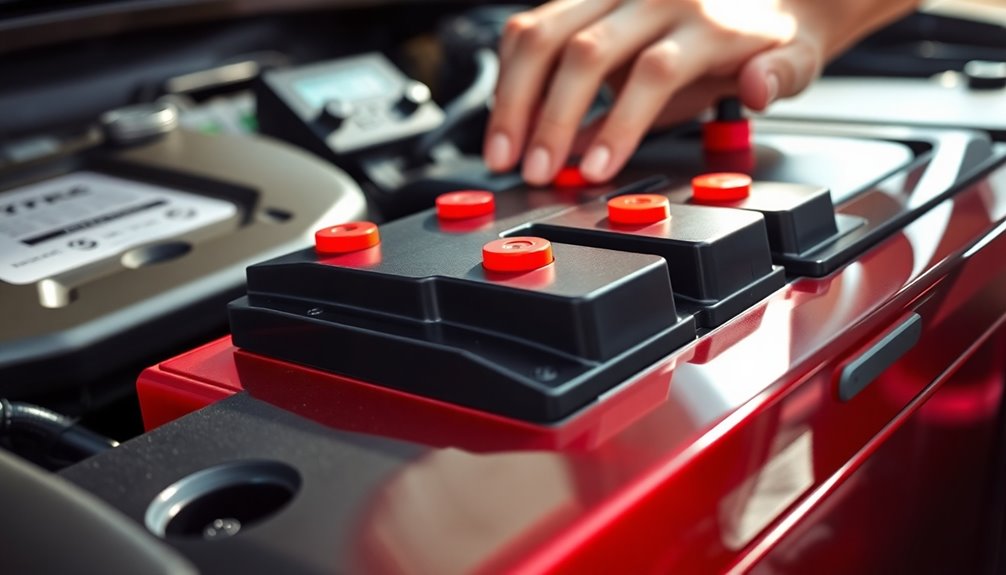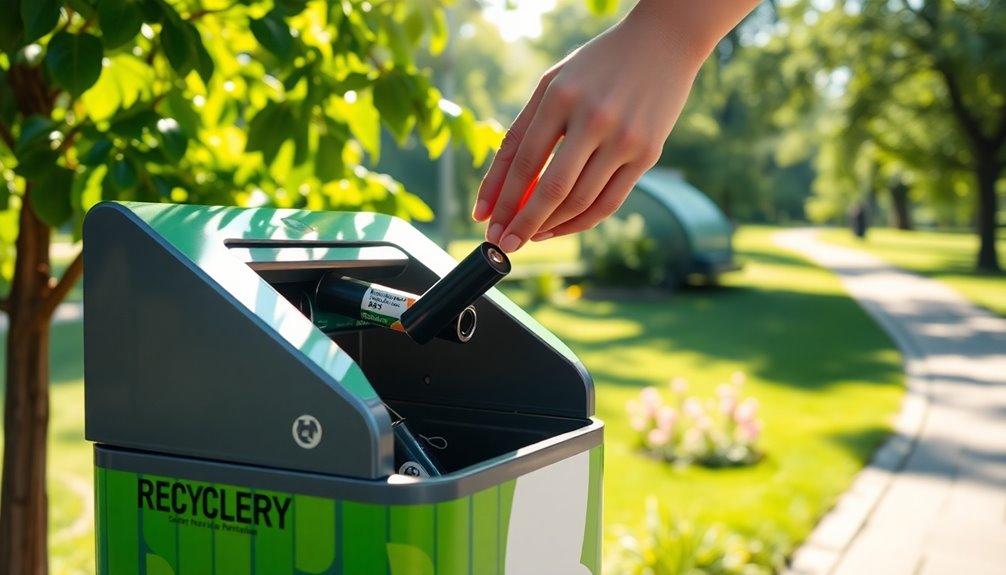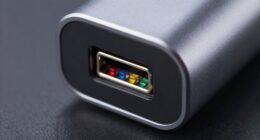You can't just throw away batteries; they contain hazardous materials that can leach into the environment, posing serious health risks. Proper disposal is vital. Some batteries, like alkaline ones, may not be hazardous in many states, but others, like button cells and lead-acid batteries, require special recycling. Always check local guidelines and use recycling programs or hazardous waste collection days. Taping the terminals of 9-volt batteries prevents short-circuiting, and storing them safely is important too. To stay safe and informed on proper disposal methods, there's more significant information you should consider.
Key Takeaways
- Most batteries cannot be thrown away; improper disposal can harm the environment and health due to hazardous materials.
- Single-use alkaline batteries are non-hazardous in many states, but always check local regulations before disposal.
- Rechargeable and lead-acid batteries must be recycled at designated centers or hazardous waste events to prevent environmental damage.
- Follow safety precautions like taping terminals and storing batteries in non-conductive containers to avoid leaks and short-circuiting.
- Participate in community recycling programs and initiatives to promote responsible battery disposal and reduce waste effectively.
Importance of Battery Disposal
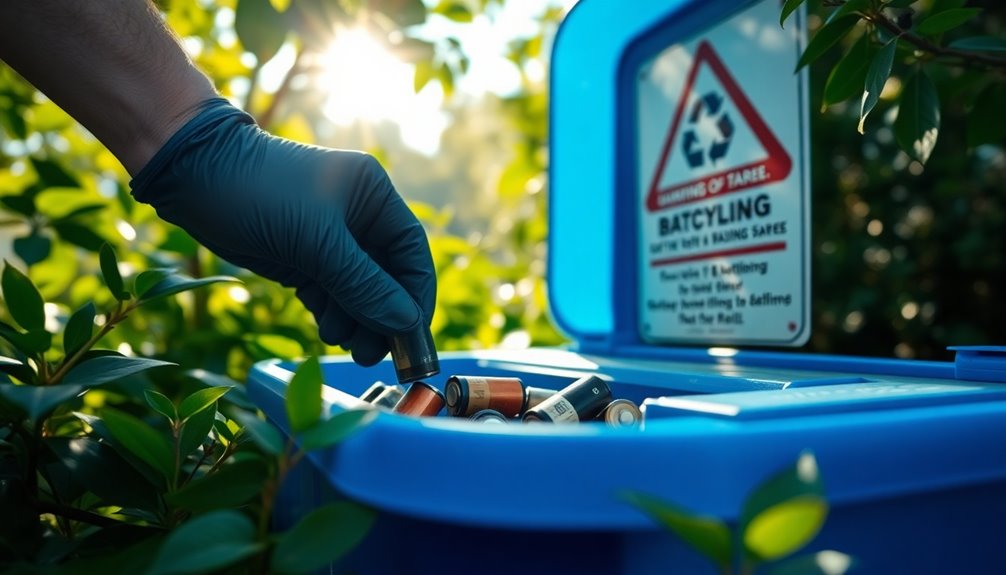
The importance of battery disposal can't be overstated. Improper disposal of batteries contributes to over 180,000 tons of battery waste yearly, leaching hazardous chemicals into the environment and threatening soil and water quality.
By recycling batteries, you recover valuable materials like lead, lithium, and nickel, reducing the need for new raw materials and promoting sustainability. Responsible disposal can save up to 90% of the energy needed to produce new batteries, greatly lowering carbon emissions.
Many states classify batteries as household hazardous waste, making it illegal to throw them in regular trash. Following local regulations guarantees compliance and protects ecosystems from toxic substances, helping you avoid potential legal penalties for improper disposal.
Be proactive about battery recycling—it's essential for our planet.
Types of Batteries
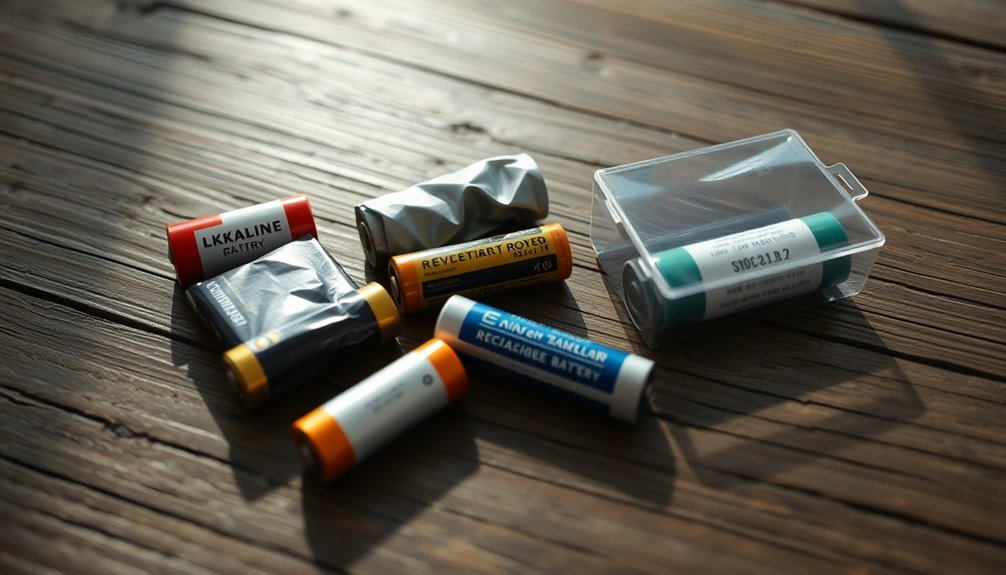
When you think about batteries, you'll find two main types: single-use and rechargeable.
Single-use batteries, like AA and AAA, are designed for one-time use, while rechargeable ones can be used multiple times.
Understanding these differences is key to knowing how to dispose of them properly.
Single-Use Battery Overview
Single-use batteries play an essential role in powering everyday devices, from remote controls to flashlights. Common types include AA, AAA, D-cell, and 9-volt batteries.
Alkaline batteries are generally considered non-hazardous and can be disposed of in regular trash in most states, except California, where they're classified as hazardous waste.
However, button cell batteries, often found in watches, contain harmful materials like silver and mercury, requiring special recycling procedures.
With over three billion dry-cell batteries purchased annually in the U.S., single-use batteries considerably impact landfill waste.
To recycle these batteries responsibly, check with local solid waste districts or programs like Call2Recycle to help minimize environmental harm.
Rechargeable Battery Characteristics
Rechargeable batteries offer a sustainable alternative to their single-use counterparts, providing the ability to power your devices multiple times before needing replacement. Common types include lithium-ion, found in smartphones, and nickel-cadmium, often used in power tools. Here's a quick comparison:
| Battery Type | Key Features |
|---|---|
| Lithium-Ion | High energy density, lightweight |
| Nickel-Cadmium | Durable, good for high-drain devices |
| Nickel-Metal Hydride | Eco-friendly, less toxic |
| Toxic Metals | Cadmium, lead, require careful disposal |
| Recycling Facilities | Necessary for safe disposal to meet environmental regulations |
It's essential to recycle disposed of batteries at designated facilities to avoid harmful environmental impacts. Always guarantee safe disposal to protect both your devices and the planet.
Proper Disposal Methods
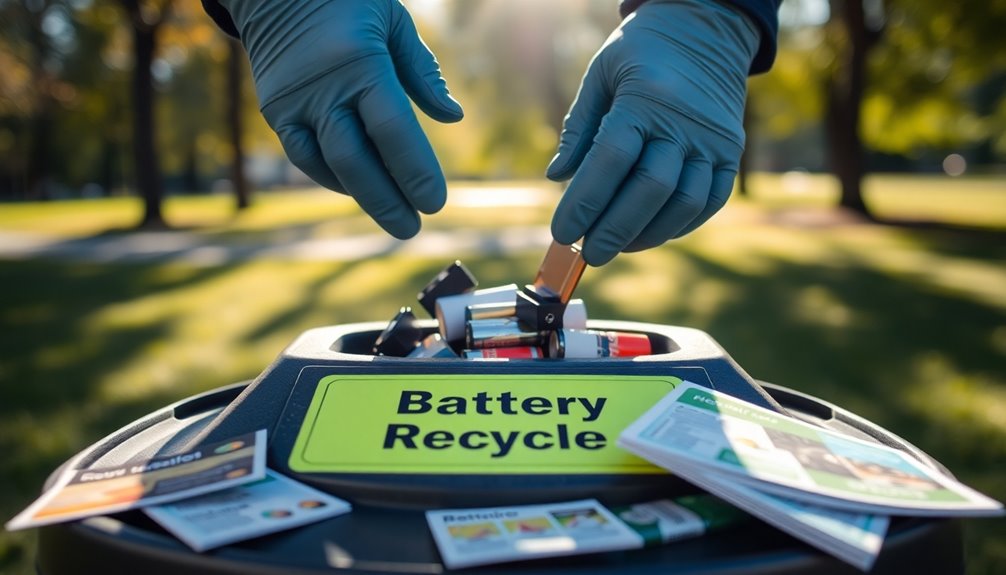
Although you might think tossing batteries in the trash is acceptable, proper disposal methods are essential for protecting the environment and your community.
Here are four safe ways to dispose of batteries:
- Local Recycling Centers: Drop off rechargeable and lead-acid batteries at designated recycling facilities.
- Hazardous Waste Collection Days: Participate in community events that safely collect hazardous waste, including alkaline batteries.
- Mail-in Recycling Programs: Use services like Call2Recycle, which allow you to mail in your batteries for recycling.
- Tape Over Terminals: For 9-volt batteries, tape over the terminals before disposal to prevent short-circuiting.
Recycling Options Available
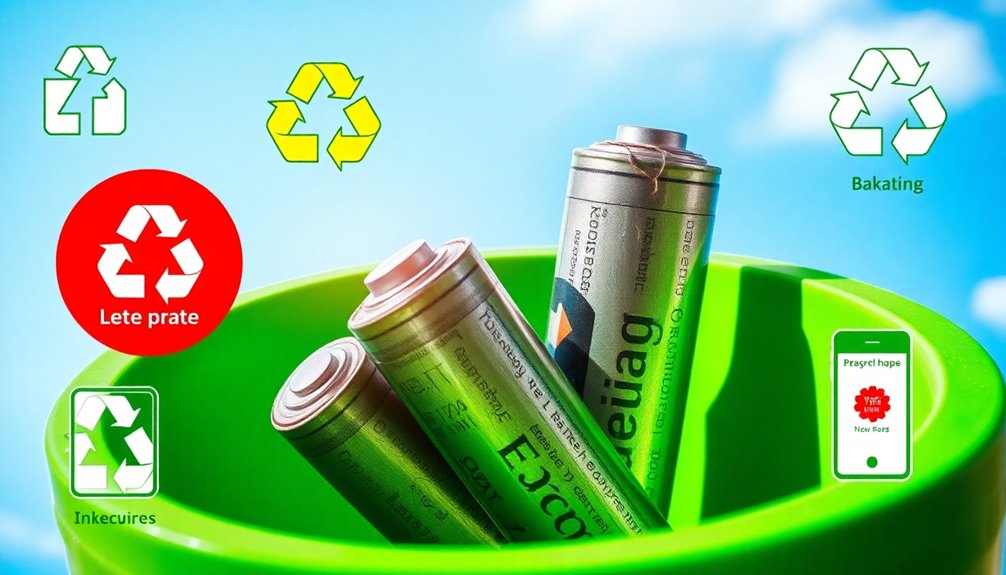
Proper disposal methods lead directly to a range of recycling options that make it easier for you to manage used batteries responsibly.
You can check for Call2Recycle bins at retailers like Home Depot and Best Buy, which allow you to drop off various battery types. Local solid waste districts often organize battery collection events, giving you a chance to recycle batteries safely.
If you prefer convenience, consider mail-in recycling programs where you buy kits for sending used batteries to recycling facilities. Additionally, community recycling initiatives raise awareness and encourage participation in battery recycling efforts.
Online resources like Earth911's Recycling Search can help you find a battery recycling location near you. Remember, batteries should be recycled, especially household and single-use batteries. Recycling is an essential part of maintaining financial health by reducing waste and promoting sustainability.
Safety Precautions
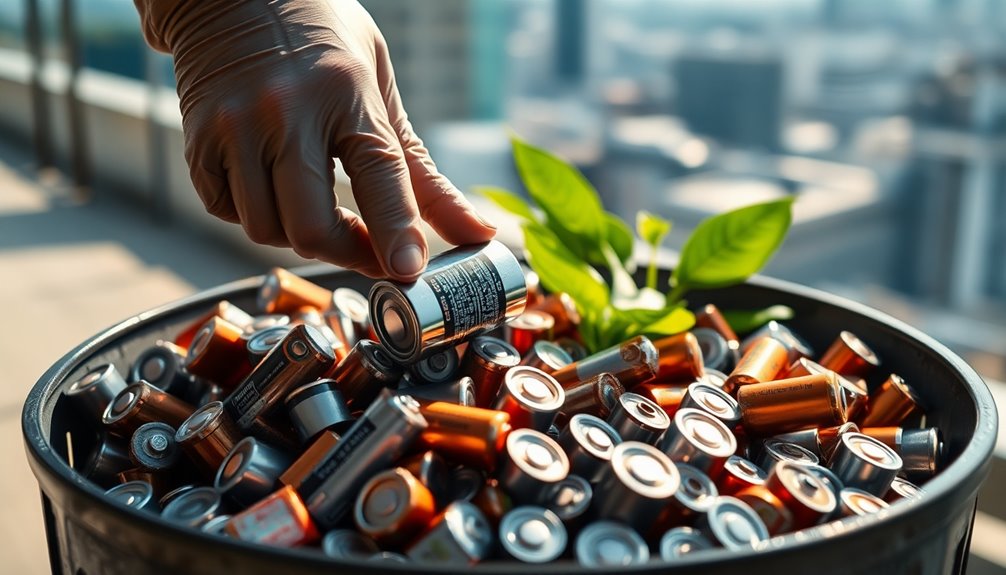
When disposing of batteries, it's crucial to take safety precautions to protect yourself and the environment. Here are some key steps to follow:
- Store batteries in a cool, dry place to reduce the risk of leaking or fire hazards.
- Tape terminals of 9-volt batteries with non-conductive tape to prevent short-circuiting during transport.
- Avoid mixing different types of batteries when disposing of them, as this can lead to dangerous chemical reactions.
- Wear gloves when handling damaged or leaking batteries to shield yourself from harmful substances.
Always follow local guidelines for hazardous waste disposal to guarantee safe recycling and compliance with regulations.
Taking these precautions will help you dispose of batteries safely and responsibly.
State Disposal Regulations

Understanding state disposal regulations is crucial for anyone looking to dispose of batteries responsibly. Regulations vary greatly, with some states classifying all battery types as hazardous waste, while others treat alkaline batteries as non-hazardous. It's important to check local regulations for specific collection programs or drop-off locations.
| Battery Type | Disposal Regulation | Notes |
|---|---|---|
| Rechargeable Batteries | Often considered hazardous waste | Must be recycled properly |
| Alkaline Batteries | Usually non-hazardous in most states | Can often be disposed of in regular trash |
| Lead-Acid Batteries | Prohibited in landfills | Return to retailers or recycling facilities |
| State Regulations | Vary by state | Always verify local laws |
| EPA Guidelines | Provide resources for compliance | Crucial for public health protection |
Make sure you follow the proper handling guidelines to keep your community safe.
Single-Use Battery Guidelines
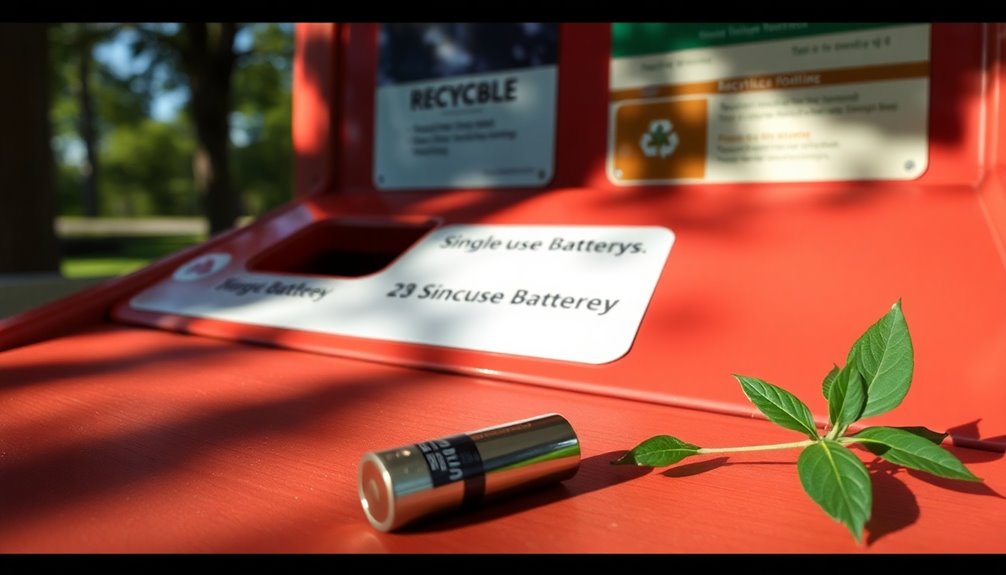
How should you dispose of single-use batteries? Proper disposal is key to safety and environmental health. Here are some guidelines to follow:
- Check local regulations: In most states, single-use batteries are non-hazardous, but California classifies all batteries as hazardous waste.
- Utilize recycling options: Look for community collection programs for alkaline batteries, as they can be repurposed rather than sent to landfills.
- Handle button cell batteries carefully: These may contain silver and mercury, requiring special disposal methods.
- Prevent fire hazards: Always tape terminals of 9-volt batteries to avoid accidental current production.
Rechargeable Battery Disposal
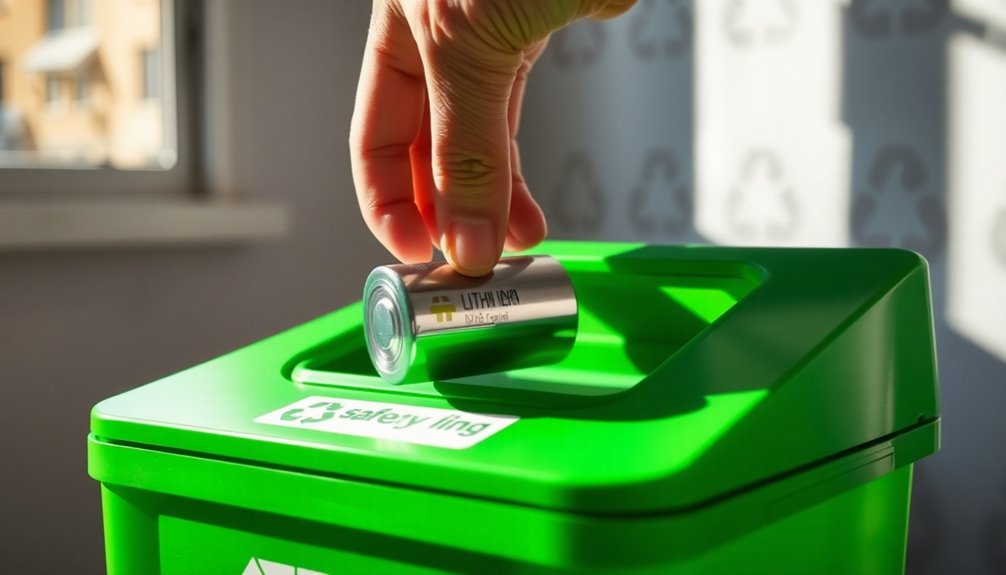
While single-use batteries have specific disposal guidelines, rechargeable batteries require careful handling due to the toxic metals they contain.
Proper rechargeable battery disposal is essential because many states have laws against throwing them in the trash. Batteries like lithium-ion and nickel-cadmium can release hazardous materials into the environment, so you'll want to prioritize responsible recycling practices.
Look for drop-off locations at retailers such as The Home Depot or electronics stores, where you can recycle rechargeable batteries free of charge.
Before recycling, remember to remove the batteries from devices and store them in a non-conductive container to prevent leaks or short-circuiting.
Community Recycling Initiatives
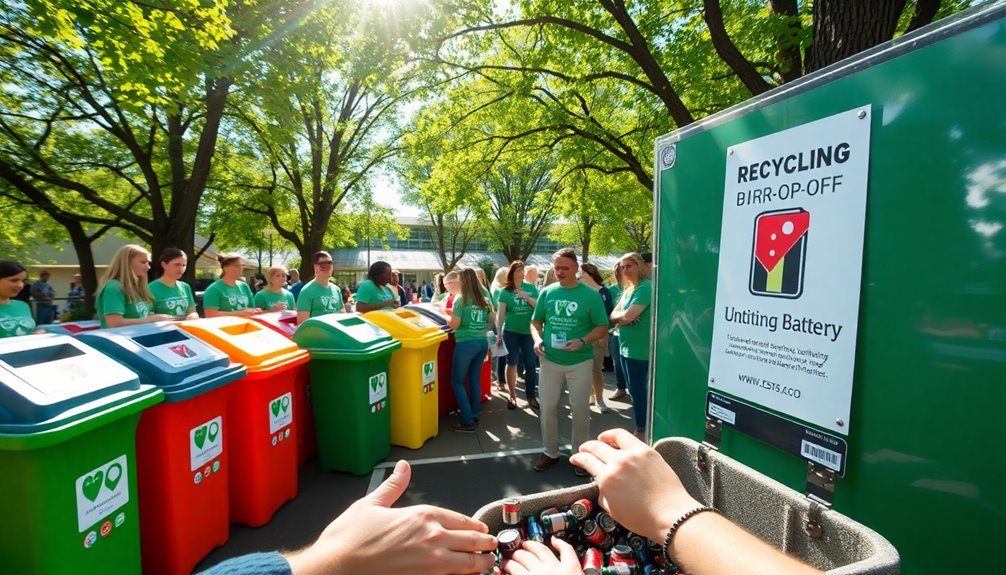
As communities become more aware of the environmental impact of battery waste, many are launching recycling initiatives that make it easier for you to dispose of batteries safely.
Here are a few ways these community recycling initiatives work:
- Battery collection drives directly engage residents to safely drop off old batteries.
- Local solid waste districts partner with organizations like Call2Recycle to set up accessible drop-off locations.
- Battery recycling booths at community events, like Earth Day, promote sustainable practices and encourage participation.
- Educational programs raise awareness about proper battery disposal and the hazards of improper disposal.
Frequently Asked Questions
How Do You Dispose of Batteries Properly?
When disposing of batteries, you need to know what type you're dealing with. Single-use alkaline batteries can usually go in the trash, but check your state laws first.
For rechargeable and lithium-ion batteries, always recycle them at designated facilities.
Tape over the terminals of 9-volt batteries to avoid short-circuiting.
Finally, find local recycling centers or retailers that accept batteries, making disposal safe and easy for you.
Can You Get in Trouble for Throwing Away Batteries?
You might think tossing batteries in the trash is harmless, but it can lead to serious consequences.
On one hand, it seems convenient, but on the other, it's illegal in many places. You could face fines or legal trouble for improper disposal.
Instead, you should familiarize yourself with local regulations and find designated recycling facilities.
How Do I Dispose of AA Batteries in Maryland?
To dispose of AA batteries in Maryland, you can throw them in the trash since they're considered non-hazardous.
However, recycling's a better option to help reduce waste. Check local recycling programs for collection events or drop-off spots.
Retailers like Home Depot and Best Buy often accept used batteries for recycling.
Always stay updated with your local waste management guidelines to guarantee you're following the latest disposal regulations.
How Do You Get Rid of a Dead Battery?
You might think tossing a dead battery in the trash is no big deal, but it can harm the environment.
To get rid of a dead battery safely, find a local recycling program or retailer that offers drop-off services.
Make sure to cover the terminals of 9-volt batteries with non-conductive tape before transport.
Conclusion
So, before you toss that battery like last week's leftovers, think twice! Unless you're aiming for a dramatic explosion or a surprise visit from the eco-police, proper disposal is key. Remember, your trash can isn't a battery graveyard! Embrace recycling like it's the hottest trend—because it is! Join a community initiative, or at least know your state regulations. You wouldn't throw out a Picasso, right? So don't throw away batteries like they're just junk!


